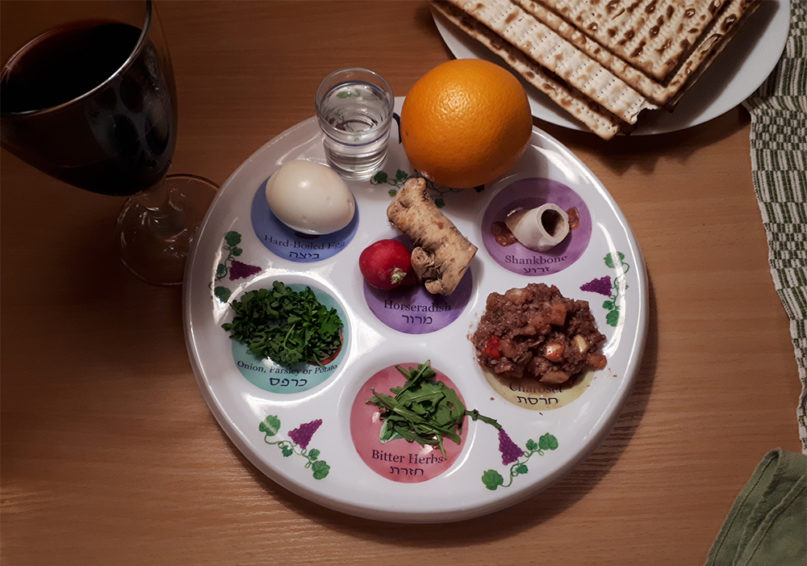Yes, I am talking about the proliferation of Zoom seders.
But, that is certainly not all to the Haggadah’s classic question: “Why is this night different from all other nights?”
OK, let’s talk about Zoom seders.
First: kudos (or, as we Jews like to say, yasher koach) to all those who have only recently figured out how to use this technology.
True — it was always there for business conferences.
But now, it has become an elixir, a life line — and I salute those of a certain age (I might be that certain age) who have learned to use Zoom, Facebook live, etc. I have already done a Zoom funeral service (alas, for my stepmother, who died of COVID-19) and have participated in a Zoom shiva for an old friend.
We are a resilient people, and we actually modeled that resilience to the ancient world.
Nothing proves this more than Pesach itself.
Consider: once upon a time, when the ancient Temple stood in Jerusalem, our ancestors observed Pesach with sacrifice. When the Romans destroyed the Temple, we had no choice. We moved the celebration off the precincts of the now-in-ashes Temple, and exported it to the table in the home. From the temple to the table.
Which is where it has remained to this day.
You want resilience and adaptability? Look no further than how some Orthodox leaders have responded to the COVID-19 crisis and its effect on this year’s Pesach, as well as other religious matters.
- Rabbi Mordechai Dovid Unger, the spiritual leader of the Bobover sect of Hasidim. He has instructed his followers to abstain from setting up private minyanim, even with social distancing.
- The leaders of the Orthodox Union, the Agudath Israel of America, Igud HaRabbanim– Rabbinical Alliance of America, the Lakewood Vaad, National Council of Young Israel, and the Rabbinical Council of America issued a rare joint statement. The statement forbids shared seders, as well as Jews traveling to be with family.
- The Rabbinical Council of America has even gone so far as to realize the need for connection during COVID-19 seclusion. It thus permits, at least during this crisis, the use of technology on Shabbat and holidays.
This is shaat ha-dechat, a time of emergency and distress.
Which leads me to the second way that this Pesach is about to be different.
It is about how we eat during Pesach.
At least some of us, usually strict about getting rid of chametz for Pesach, are letting that go — for this year.
I am talking about the pasta, the bread, the cereal.
This year is different. Some of my normally observant friends tell me that they are not giving their chametz away.
Why?
They might need to eat it.
I get it.
I agree.
At different times in Jewish history, there were tendencies to either become machmir (stringent) or meikil (permissive).
I suggest that we are in the meikil phase.
I think of one of the more unusual artifacts from the Holocaust — a handwritten prayer, in elegant Hebrew, for eating chametz, written in 1944 in Bergen-Belsen.
It was written by several rabbis as inspiration for Dutch Jews who were interred in that camp.
Because, eating chametz was a matter of life or death.
Before eating Chametz say the following with intent & devotion:
Our Father in Heaven! It is known to You that we desire to fulfill Your will and observe the Passover holiday by eating Matzah and safeguarding against Chametz. But our hearts are pained at the captivity which prevents us, and we find ourselves in danger of our lives. We are hereby ready to fulfill Your commandments “And you shall live by them (the commandments)” and not die by them, and to observe the caution of “guard yourself and watch your soul/life very much.” Therefore our prayer to You is that You keep us alive, and sustain us, and redeem us speedily, so that we may observe Your laws and fulfill Your will and serve You with a full heart. Amen!
“Our hearts are pained at the captivity which prevents us, and we find ourselves in danger of our lives.”
So, yes — tomorrow evening will be a leil shmurim, a night of watching — in a way that we could not have known.
We will be watching each other — paradoxically separated by screens, and united by screens.
As for the Angel of Death….
Pass us by. Pass all of us by.
A good and sweet Pesach to my Jewish friends. Eid mubarak to my Muslim friends.
And, during Holy Week for Christians: may we all roll the stone away from the tomb, and experience a resurrection of hope.






